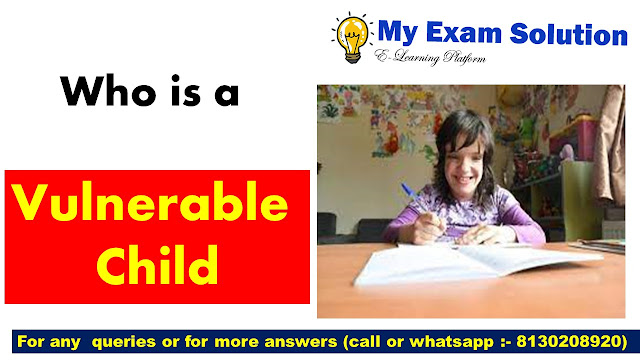Who is a vulnerable child? Describe counseling for children with
disability
A vulnerable child is one who is at risk of harm or
exploitation, due to factors such as poverty, homelessness, abuse, neglect, or
disability. Children with disabilities, who may have additional challenges
related to their physical, mental, or developmental abilities, can also be
considered vulnerable.
Counseling for children with disabilities may involve working
with them and their families to address the specific challenges they face. This
may include helping the child to understand and cope with their disability,
improving communication and social skills, building self-esteem and resilience,
and addressing any mental health or behavioral concerns.
It's important for the counselor to use an approach that is
developmentally appropriate, culturally sensitive, and tailored to the child's
individual needs. This may involve using play therapy, art therapy, or other
expressive therapies, as well as talk therapy. The counselor may also work with
the child's teachers, doctors, and other support providers to ensure a
coordinated and effective approach.
How would you describe counseling for children with disability
Counseling for children with disabilities is a form of
therapy that aims to help children with physical, mental, or developmental
difficulties cope with their challenges and improve their overall well-being.
It involves a supportive, non-judgmental relationship between the child and
counselor, in which the child is encouraged to express their feelings and
thoughts.
The counselor may use various therapeutic techniques, such as
play therapy, art therapy, or talk therapy, to help the child understand and
process their experiences. They may also work with the child to develop coping
skills, build self-esteem, and improve communication and social skills.
Counseling for children with disabilities also involves
collaborating with the child's family, teachers, and other support providers to
ensure a holistic approach that addresses the child's needs in all aspects of
their life. The goal is to help the child lead a fulfilling and satisfying
life, despite the challenges they may face due to their disability.
What do you mean by vulnerable child
A vulnerable child is a child who is at greater risk of harm,
exploitation, or abuse due to their circumstances, environment, or personal
characteristics. Some common factors that can make a child vulnerable include
poverty, homelessness, abuse or neglect, lack of support from family or
caregivers, disabilities, migration or displacement, and being a member of a
marginalized or minority group.
Vulnerable children are in need of protection and support to
ensure their basic rights and well-being. This may involve providing them with
access to healthcare, education, safe and stable housing, and other essential
resources. It may also involve advocating for their rights and working to
prevent further harm or exploitation.
In general, a vulnerable child is someone who is in a
situation of disadvantage and is in need of special care, attention, and
support to ensure their safety, health, and overall well-being.
What is the role of Counsellor for children with special needs
The role of a counselor for children with special needs is to
provide emotional and psychological support to help these children cope with
their challenges and improve their overall well-being. Some specific
responsibilities of a counselor for children with special needs may include:
- Assessment: Assessing the child's individual needs, strengths, and challenges, and developing a personalized treatment plan.
- Therapy: Providing individual or group therapy sessions that are developmentally appropriate, culturally sensitive, and tailored to the child's specific needs. This may involve talk therapy, play therapy, art therapy, or other therapeutic modalities.
- Collaboration: Working with other professionals, such as teachers, doctors, and family members, to provide a coordinated and comprehensive approach to the child's care.
- Emotional Support: Providing a safe and supportive environment in which the child can express their feelings and thoughts, and building their self-esteem and resilience.
- Advocacy: Advocating for the child's needs and rights, and working to ensure they receive the resources and support they need to lead a fulfilling life.
In general, the role of a counselor for children with special
needs is to provide a supportive and nurturing environment in which these
children can grow, develop, and thrive, despite their challenges.
ALSO READ:-
- What is art therapy? Describe the steps in art therapy
- Explain the need and scope of educational counseling
- Describe the different ways in which emotions can be managed effectively
Whatsapp :- 8130208920
Youtube :- Myexamsolution







0 comments:
Note: Only a member of this blog may post a comment.